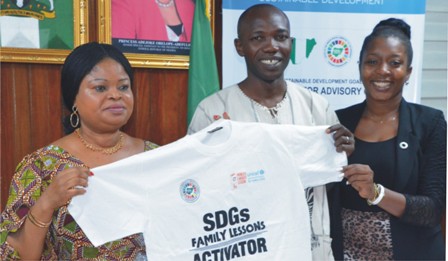Editorial
Rights Day: Leaving No One Behind

Many countries across the world observed this year’s Human Rights Day yesterday, December 10, 2020. An annual celebration, it was on this day the United Nations (UN) adopted Universal Declaration of Human Rights in 1948 and since then, Human Rights Day is commemorated globally.
The Human Rights Day was formally espoused at the 317th Plenary Meeting of the General Assembly on 4th December, 1950. This was the first-ever global document on human rights which adumbrates the fundamental rights of all persons that need to be protected universally.
This year’s theme, “Recover Better – Stand Up for Human Rights”, relates to the COVID-19 pandemic and focuses on building back better by ensuring that human rights are central to recovery efforts. Global goals can be attained if nations create equal opportunities for all, address the failures exposed and exploited by COVID-19, and apply human rights principles to tackle entrenched, systematic, and intergenerational inequalities, exclusion and discrimination.
The theme is a generic call to action to engage the public and the UN family to bolster transformative action and showcase practical and inspirational examples that can recover and promote more resilient and just societies. Human rights form the core of the Sustainable Development Goals (SDGs), as in the absence of human dignity, sustainable development will remain elusive.
The COVID-19 crisis has been fuelled by deepening poverty, rising inequalities, structural and entrenched discrimination and other gaps in human rights protection. Only measures to close these gaps and advance human rights can ensure we fully recover and build back a world that is better, more spirited, just, and sustainable.
As many countries have entered their second wave of the pandemic, it has become explicit that at the end of the crisis, we simply cannot return to how the world was before. From this shared tragedy comes an opportunity to build back better by putting respect for human rights at the heart of the recovery.
However, that may not be the case with many countries. After more than five years in the saddle, the administration of President Muhammadu Buhari has witnessed more human rights abuses than those before it since 1999. Boko Haram still attacks, abducts and kills in the North-East and carries through many other lethal onslaughts. Violent clashes between farmers and herdsmen have equally ended in fatalities.
In all, very little progress has been made in sanctioning human rights violations and abuses by security forces, insurgents and other perpetrators of the herders and farmers’ clashes. Also, no one has been brought to justice for killing the Islamic Movement of Nigeria’s (IMN) protesters in some northern states.
Security forces have always obstructed lawful concourse. Several protesters including journalists were arrested and detained across Nigeria for participating in the #RevolutionNow protest. Security officials beat up a journalists and fired teargas and live ammunition to disperse activists demanding the release of OlawaleBakare and Omoyele Sowore.
On Tuesday, October 20, 2020, Nigerians watched in consternation and utter disbelief as men dressed in military uniforms shot at protesters calling for an end to police brutality at the Lekki toll gate in Lagos. We condemn the excessive force against those protesters and call on the international community to bring the perpetrators to justice.
The right to freedom of expression is progressively restricted in Nigeria. Journalists, bloggers and media activists are charged with cybercrime and terrorism under the Cybercrime Act of 2015 and Terrorism (Prevention) (Amendment) Act of 2013 for performing their duties. Amnesty International recently documented 19 cases of assault, unrestrained arrests, and detention of journalists.
The National Assembly has been considering two draft legislations: Protection from Internet Falsehood and Manipulation and Other Related Offences Bill 2019 and the Bill to Establish a National Commission for the Prohibition of Hate Speech. If passed into law, the bills will give authorities harsh, unforbearing powers to shut down the internet, make criticising the government severely punishable.
Violence against children thrives despite the enactment of the Child Rights Act (CRA). Since the passage of the CRA in 2003, just over 20 states out of the 36 states have domesticated the Act. Most northern states are yet to adopt the CRA. This is shameful. Children are sexually abused, face discrimination and multiple barriers in contemptuous defiance of the legally binding obligation on the right to education.
Torture is pervasive within the Nigerian criminal justice system. Amnesty International says it always receives credible reports that security agents arbitrarily detain, brutalise, and keep suspects incommunicado. Similarly, Nigerian prisons are over-crowded as 70 per cent of the inmates, usually awaiting trial detainees, have been incarcerated for as long as five years.
To curb the escalation of the COVID-19 crisis, rights abuses must end by eliminating discrimination and inequality. For that, economic, social, and cultural rights should be promoted and protected, while a social contract for a new epoch is highly desirable. There is an urgent need for individuals, governments, civil society groups, faith-based organisations, rural communities and the private sector to effectively collaborate to build a post-COVID world that will be beneficial to present and future generations.
Editorial
As NDG Ends Season 2

Editorial
Beginning A New Dawn At RSNC

Editorial
Sustaining OBALGA’s Ban On Street Trading

-

 News2 days ago
News2 days agoAmend Constitution To Accommodate State Police, Tinubu Tells Senators
-

 Politics2 days ago
Politics2 days agoSenate Urges Tinubu To Sack CAC Boss
-

 News2 days ago
News2 days agoDisu Takes Over As New IGP …Declares Total War On Corruption, Impunity
-
Business2 days ago
President Tinubu Extends Raw Shea Nuts Export Ban To 2027
-
Business2 days ago
Crisis Response: EU-project Delivers New Vet. Clinic To Katsina Govt.
-
Business2 days ago
President Tinubu Approves Extension Ban On Raw Shea Nut Export
-
News2 days ago
25 Killed In Adamawa Jihadist Attacks
-
Business2 days ago
FG Pushes Cassava Bioethanol Drive To Boost Industrial Growth

